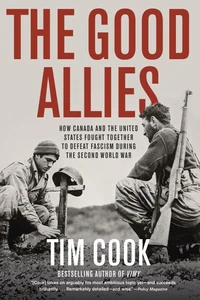NATIONAL BESTSELLERFINALIST FOR THE OTTAWA BOOK AWARDS A masterful telling of the way World War Two has been remembered, forgotten, and remade by Canada over seventy-five years. The Second World War shaped modern Canada. It led to the country's emergence as a middle power on the world stage; the rise of the welfare state; industrialization, urbanization, and population growth. After the war, Canada increasingly turned toward the United States in matters of trade, security, and popular culture, which then sparked a desire to strengthen Canadian nationalism from the threat of American hegemony.
The Fight for History examines how Canadians framed and reframed the war experience over time. Just as the importance of the battle of Vimy Ridge to Canadians rose, fell, and rose again over a 100-year period, the meaning of Canada's Second World War followed a similar pattern. But the Second World War's relevance to Canada led to conflict between veterans and others in society-more so than in the previous war-as well as a more rapid diminishment of its significance.
By the end of the 20th century, Canada's experiences in the war were largely framed as a series of disasters. Canadians seemed to want to talk only of the defeats at Hong Kong and Dieppe or the racially driven policy of the forced relocation of Japanese-Canadians. In the history books and media, there was little discussion of Canada's crucial role in the Battle of the Atlantic, the success of its armies in Italy and other parts of Europe, or the massive contribution of war materials made on the home front.
No other victorious nation underwent this bizarre reframing of the war, remaking victories into defeats. The Fight for History is about the efforts to restore a more balanced portrait of Canada's contribution in the global conflict. This is the story of how Canada has talked about the war in the past, how we tried to bury it, and how it was restored. This is the history of a constellation of changing ideas, with many historical twists and turns, and a series of fascinating actors and events.
NATIONAL BESTSELLERFINALIST FOR THE OTTAWA BOOK AWARDS A masterful telling of the way World War Two has been remembered, forgotten, and remade by Canada over seventy-five years. The Second World War shaped modern Canada. It led to the country's emergence as a middle power on the world stage; the rise of the welfare state; industrialization, urbanization, and population growth. After the war, Canada increasingly turned toward the United States in matters of trade, security, and popular culture, which then sparked a desire to strengthen Canadian nationalism from the threat of American hegemony.
The Fight for History examines how Canadians framed and reframed the war experience over time. Just as the importance of the battle of Vimy Ridge to Canadians rose, fell, and rose again over a 100-year period, the meaning of Canada's Second World War followed a similar pattern. But the Second World War's relevance to Canada led to conflict between veterans and others in society-more so than in the previous war-as well as a more rapid diminishment of its significance.
By the end of the 20th century, Canada's experiences in the war were largely framed as a series of disasters. Canadians seemed to want to talk only of the defeats at Hong Kong and Dieppe or the racially driven policy of the forced relocation of Japanese-Canadians. In the history books and media, there was little discussion of Canada's crucial role in the Battle of the Atlantic, the success of its armies in Italy and other parts of Europe, or the massive contribution of war materials made on the home front.
No other victorious nation underwent this bizarre reframing of the war, remaking victories into defeats. The Fight for History is about the efforts to restore a more balanced portrait of Canada's contribution in the global conflict. This is the story of how Canada has talked about the war in the past, how we tried to bury it, and how it was restored. This is the history of a constellation of changing ideas, with many historical twists and turns, and a series of fascinating actors and events.

 , qui est-ce ?
, qui est-ce ?